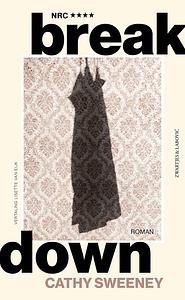Take a photo of a barcode or cover
An interesting commentary on twenty first century Irish motherhood (if you fall into the rat race of life). I liked how complex the female lead was and thought she was honest, although unlikeable, there was something raw and compelling about her honestly and life experience. In general I thought it was a good read. A cautionary tale to the next generation of Irish women.
emotional
mysterious
reflective
slow-paced
Plot or Character Driven:
Character
Strong character development:
Yes
Loveable characters:
No
Diverse cast of characters:
No
Flaws of characters a main focus:
Yes
emotional
tense
challenging
dark
emotional
reflective
medium-paced
Plot or Character Driven:
A mix
Strong character development:
No
Loveable characters:
No
Diverse cast of characters:
No
Flaws of characters a main focus:
Yes
There is something both audacious and maddening about Cathy Sweeney’s Breakdown. It is a novel of contradictions—of fury and listlessness, escape and entrapment, self-discovery and self-destruction. It follows an unnamed woman who one day simply walks out of her life, abandoning her husband, her grown children, and the numbing familiarity of her Dublin home. She embarks on a disjointed odyssey across Ireland and Wales, a journey that feels more like a slow-motion implosion than an act of liberation.
To call this a story of a mental breakdown feels almost misleading. The protagonist is not unraveling so much as shedding—peeling away the layers of a life that no longer fits, though whether she ever truly inhabited it remains an open question. Sweeney captures this with bleak precision, writing with the kind of existential detachment that is both hypnotic and frustrating. There is a sense of profound exhaustion in the novel, not just in the woman’s actions but in the very fabric of the prose, in the cyclical ruminations on love, obligation, and the impossibility of truly knowing another person: "People change. We lose bits of ourselves and get new bits, until one day two old friends who meet in a restaurant are nothing but shadow puppets to each other, both trying to resuscitate connection that died years ago, leaving each other with a strange rage that over time morphs back into ghost-love."
Yet for all its melancholic lyricism, Breakdown is not an easy book to love. The protagonist is difficult—spoiled, self-absorbed, and prone to pretentious musings that feel less like revelation and more like self-pity dressed in existential malaise. She has suffered, yes, but she is also deeply unlikeable, and the novel does little to reconcile the two. There is something performative in her escape, a kind of curated rebellion that lacks true urgency. She prepares for her departure with methodical precision, making it difficult to read her actions as impulsive, let alone symptomatic of a genuine collapse. Her departure feels less like a breakdown and more like a carefully staged disappearing act—an act of privilege disguised as crisis.
Still, there is something oddly compelling about Breakdown. Sweeney wields language with razor-sharp control, and beneath the protagonist’s exasperating self-absorption lies a more universal meditation on aging, regret, and the crushing weight of a life half-lived. The novel doesn’t offer catharsis, nor does it ask for sympathy. Instead, it lingers in the uncomfortable space between desire and obligation, between longing and dissatisfaction. Whether you find that space illuminating or infuriating will likely determine your experience with the book. For me, it was both.
To call this a story of a mental breakdown feels almost misleading. The protagonist is not unraveling so much as shedding—peeling away the layers of a life that no longer fits, though whether she ever truly inhabited it remains an open question. Sweeney captures this with bleak precision, writing with the kind of existential detachment that is both hypnotic and frustrating. There is a sense of profound exhaustion in the novel, not just in the woman’s actions but in the very fabric of the prose, in the cyclical ruminations on love, obligation, and the impossibility of truly knowing another person: "People change. We lose bits of ourselves and get new bits, until one day two old friends who meet in a restaurant are nothing but shadow puppets to each other, both trying to resuscitate connection that died years ago, leaving each other with a strange rage that over time morphs back into ghost-love."
Yet for all its melancholic lyricism, Breakdown is not an easy book to love. The protagonist is difficult—spoiled, self-absorbed, and prone to pretentious musings that feel less like revelation and more like self-pity dressed in existential malaise. She has suffered, yes, but she is also deeply unlikeable, and the novel does little to reconcile the two. There is something performative in her escape, a kind of curated rebellion that lacks true urgency. She prepares for her departure with methodical precision, making it difficult to read her actions as impulsive, let alone symptomatic of a genuine collapse. Her departure feels less like a breakdown and more like a carefully staged disappearing act—an act of privilege disguised as crisis.
Still, there is something oddly compelling about Breakdown. Sweeney wields language with razor-sharp control, and beneath the protagonist’s exasperating self-absorption lies a more universal meditation on aging, regret, and the crushing weight of a life half-lived. The novel doesn’t offer catharsis, nor does it ask for sympathy. Instead, it lingers in the uncomfortable space between desire and obligation, between longing and dissatisfaction. Whether you find that space illuminating or infuriating will likely determine your experience with the book. For me, it was both.
mysterious
reflective
medium-paced
Plot or Character Driven:
Character
Strong character development:
Complicated
Loveable characters:
Yes
Diverse cast of characters:
Yes
Flaws of characters a main focus:
Yes
challenging
reflective
slow-paced
Plot or Character Driven:
Character
Strong character development:
Complicated
Loveable characters:
Complicated
Diverse cast of characters:
No
Flaws of characters a main focus:
Yes
dark
emotional
reflective
medium-paced
Plot or Character Driven:
Character
Strong character development:
Complicated
Loveable characters:
No
Diverse cast of characters:
No
Flaws of characters a main focus:
Yes
challenging
mysterious
reflective
medium-paced
Plot or Character Driven:
Character
Strong character development:
No
Loveable characters:
No
Diverse cast of characters:
No
Flaws of characters a main focus:
Yes
dark
emotional
funny
informative
inspiring
reflective
medium-paced
Plot or Character Driven:
Character
Strong character development:
Yes
Loveable characters:
Yes
Diverse cast of characters:
Yes
Flaws of characters a main focus:
Complicated
A gripping, compelling and highly readable discourse on the 'hidden' and taboo phenomenon of suburban ennui that creeps up on - and afflicts - many married women with children. There are obvious parallels between this book and the non-fiction work entitled 'The Feminine Mystique' by Betty Freidan.
'Breakdown' was, for me, refreshing in its realness. So many domestic fiction works nowadays - and I love this genre - feature high-flying women who are depicted as having groundbreaking careers (often in medicine/veterinary science) while also being stellar mothers, partners and housewives. Comparing oneself to these fictional superwomen is exhausting and, frankly, boring. I am not convinced by their Stepford-Wive-esque nature, and that is why 'Breakdown' - in its rawness - was such a hit with me.
Not only was the main character of this work believable and relatable, but the writing downright made me laugh aloud. The book also contains many thought-provoking insights. I appreciated the astute observation that - while Ireland prides itself on being more accepting of and vocal about women's struggles today than in the past - we are, in fact, only comfortable discussing select women's struggles. For example, women may discuss their abortion struggle - a 'safe' topic. Many insidious struggles encountered by women, however, are still very much 'taboo' and off-limits, which audiences/common culture will not tolerate talk of. Such struggles include disliking one of your offspring, and finding yourself bored with your 'nice-guy' husband.
The book shamelessly tackles these topics in a deadpan and humorous way. The book is certainly not all roses, but I have found that I prefer to immerse myself in a compellingly real narrative on a person's psyche as opposed to being sold the idealised, 'perfect' female specimen that we are often exposed to in literature.
'Breakdown' was, for me, refreshing in its realness. So many domestic fiction works nowadays - and I love this genre - feature high-flying women who are depicted as having groundbreaking careers (often in medicine/veterinary science) while also being stellar mothers, partners and housewives. Comparing oneself to these fictional superwomen is exhausting and, frankly, boring. I am not convinced by their Stepford-Wive-esque nature, and that is why 'Breakdown' - in its rawness - was such a hit with me.
Not only was the main character of this work believable and relatable, but the writing downright made me laugh aloud. The book also contains many thought-provoking insights. I appreciated the astute observation that - while Ireland prides itself on being more accepting of and vocal about women's struggles today than in the past - we are, in fact, only comfortable discussing select women's struggles. For example, women may discuss their abortion struggle - a 'safe' topic. Many insidious struggles encountered by women, however, are still very much 'taboo' and off-limits, which audiences/common culture will not tolerate talk of. Such struggles include disliking one of your offspring, and finding yourself bored with your 'nice-guy' husband.
The book shamelessly tackles these topics in a deadpan and humorous way. The book is certainly not all roses, but I have found that I prefer to immerse myself in a compellingly real narrative on a person's psyche as opposed to being sold the idealised, 'perfect' female specimen that we are often exposed to in literature.
dark
emotional
reflective
sad
medium-paced
Plot or Character Driven:
Character
Strong character development:
Yes
Loveable characters:
Complicated
Diverse cast of characters:
No
Flaws of characters a main focus:
Yes


